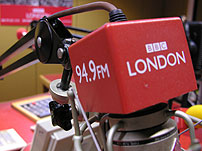h/t CST
As readers no doubt recall, on December 22nd listeners to a BBC Radio London phone-in show heard an inadequately challenged thirteen-minute antisemitic rant which later garnered both media attention and complaints from the general public, with the latter receiving dismissive responses from the BBC.
In an article titled “Bigotry on the Air: Why broadcasters need to challenge hate-mongers” which appeared at the Ethical Journalism Network, some insight into the background to the BBC’s handling of those complaints emerges. Relating to that BBC Radio London show, the EJN’s Tom Law writes:
“This case raises serious ethical questions: How do people working on the edge of live news protect themselves – and their audience – from people with a hateful agenda? How can journalists ensure that they allow free speech, but maintain their ethical duty to do no harm? And what more should be done to help journalists to counter bigoted speech?
According to chair of the Ethical Journalism Network Dorothy Byrne, many of the answers are found by applying the regulations imposed by Ofcom, Britain’s independent state regulator of broadcasting, but much depends she warns on how “hate speech” is defined.
A good broadcaster, she says, would cut the person off and apologise to the listeners, depending on the content, while some programmes would challenge the speaker. She quotes a recent example when a young Muslim woman attacking gay people on the radio. “Instead of cutting her off, the presenter argued with her vociferously and you could say that was the best way to deal with that,” says Byrne.”
The article goes on to quote the BBC’s David Jordan.
“David Jordan, Director of Editorial Policy and Standards at the BBC told us that for live radio shows where members of the public phone in, presenters and producers are obliged to follow the ‘Harm and Offence’ provision of the OFCOM code, which states they must:
“…provide adequate protection for members of the public from the inclusion in such services of harmful and/or offensive material.”
The code goes on to say that offensive material must only be used where it can be justified by journalistic context.
In addition, the BBC has its own editorial guidelines on live output. People spouting offensive views are normally dealt with directly, says Jordan. The decision to challenge offensive speech is left to presenters and journalists. The BBC also pre-screens telephone calls into phone-in shows. […]
The issue, says Jordan is not about people saying things that some people may find offensive whether it is in relation to immigration or race or the Holocaust. “It is about how those views are expressed. If they are expressed in clearly racist ways using racist phrases or words then you might cut the debate off,” he says.” [emphasis added]
David Jordan does not expand on how “racist phrases or words” are defined (or by whom) but apparently, just so long as such terminology is not employed, the BBC is not overly concerned about acting as a conduit for the mainstreaming of antisemitic discourse – which for some reason it appears not to view as falling under the OFCOM category of “harmful and/or offensive material”.
Every time such issues arise, the responses from BBC officials make the dire lack of education and awareness about the issue of antisemitism within the corporation more and more glaringly obvious.
Related Articles:
BBC Trust’s ESC rejects complaint about Tim Willcox’s ‘Jewish faces’ remark
BBC ECU rejects complaints about Tim Willcox’s ‘Jewish hands’ remarks


